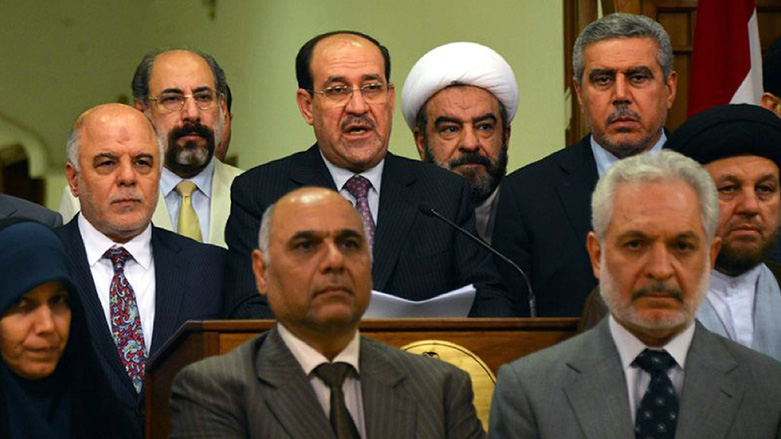Iraqi rivals declare achieving largest parliamentary bloc in contradictory statements

ERBIL (Kurdistan 24) – Iraq’s two Shia rivals on Sunday announced they had each formed alliances in the Iraqi parliament capable of forming government after months of negotiations following the May 12 national election.
There are intense rivalries between the two main Shia coalitions who are vying to form the largest parliamentary bloc and lead the new government. The two contenders are the al-Fatih and State of Law coalition, led by Hadi al-Amiri and Nouri al-Maliki, and the Sairoon-led bloc, allied with the Nasr (Victory) coalition, headed by cleric Muqtada al-Sadr and Prime Minister Haider al-Abadi respectively.
The Sadr/Abadi bloc claimed to have formed an alliance that would give them a majority bloc in parliament Sunday evening. However, its rival group, led by Shia militia commander Amiri and former Prime Minister Maliki, responded and claimed that they had created their own alliance forming the largest bloc in parliament after a number of lawmakers defected to their side.
The announcements came a day ahead of the first parliamentary session, where it is expected the new MPs will elect a speaker and begin the process of forming government.
Amiri and Maliki are two of the most prominent allies of Iran in Iraq. Abadi is seen as the Washington administration’s preferred candidate for Prime Ministership, with Sadr portraying himself as a nationalist leader who opposes the influence of both Iran and America.
The alliance led by Sadr and Abadi asserted their parliamentary bloc includes 20 electoral lists and accounts for 187 seats out of parliament’s 329 seats in total in a document published by state news agency al-Iraqiya. The national news agency claimed the bloc is in the lead to form the new government.
Late Sunday evening, both Amiri and Maliki held a press conference, saying they secured the largest parliamentary bloc, with 145 seats.
None of the two blocs included the two leading Kurdish parties, the Kurdistan Democratic Party (KDP) with 25 seats and the Patriotic Union of Kurdistan (PUK), with 18. Both have played a decisive role in determining Iraq’s Prime Minister over the past decade thanks to their combined number of seats.
Iraq held nationwide parliamentary elections on May 12. The ratification of results was delayed for months due to a contentious recount process over allegations of fraud and vote rigging.
The new Iraqi government would be tasked with rebuilding the country after a three-year war against the Islamic State (IS) and balancing relations between Iraq’s biggest allies, Iran and the US.
According to an informal system of power-sharing in Iraq, the Prime Minister’s post is held by a member of the Shia community, a Sunni Iraqi is speaker of parliament, and a Kurd holds the presidency.
Editing by Nadia Riva
